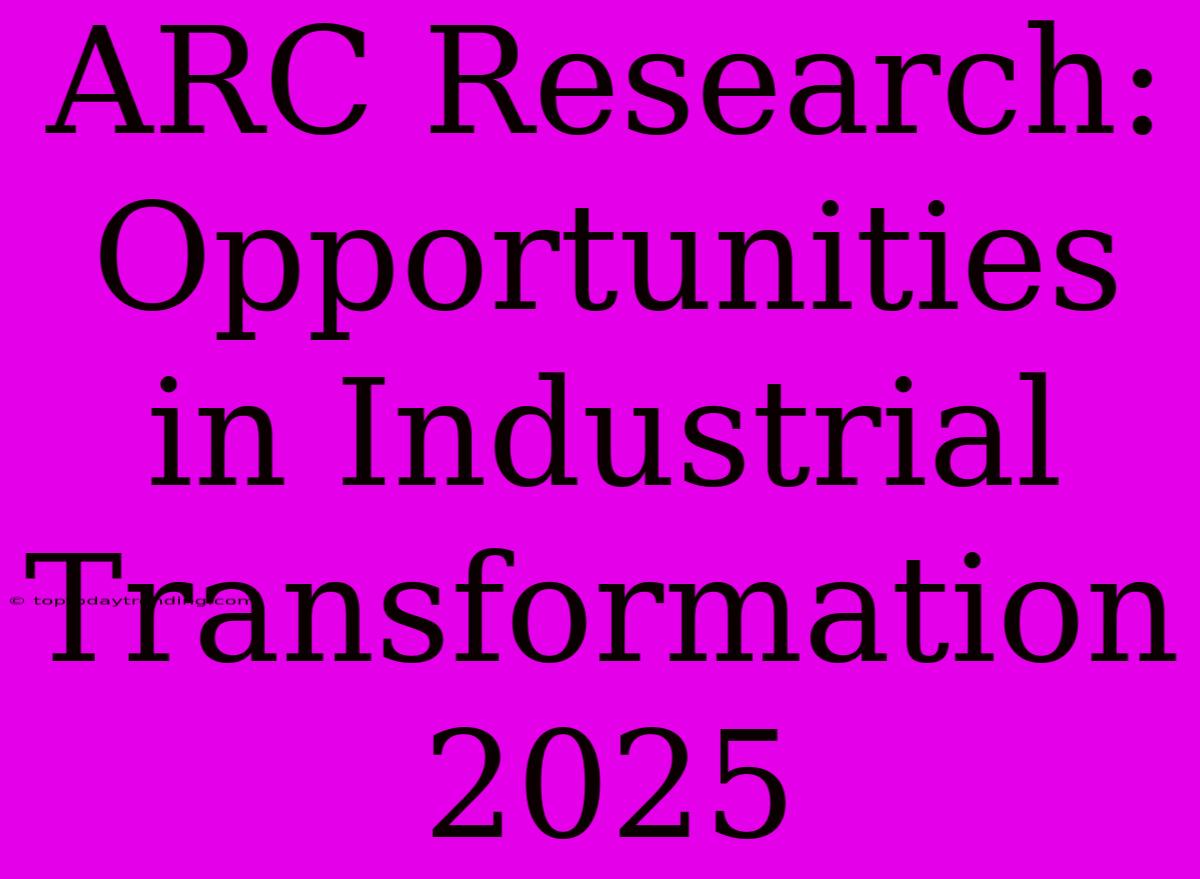ARC Research: Opportunities in Industrial Transformation 2025
The landscape of industry is rapidly changing, fueled by technological advancements and evolving consumer demands. As we approach 2025, businesses are actively seeking ways to adapt and thrive in this dynamic environment. ARC Research, a leading global advisory firm specializing in industrial automation, has identified key trends and opportunities for industrial transformation that will shape the future of manufacturing and other industrial sectors.
Key Trends Driving Industrial Transformation:
- Digitalization and Automation: The adoption of digital technologies like AI, IoT, and cloud computing is accelerating automation and creating new opportunities for efficiency and productivity gains.
- Sustainability and Circular Economy: Businesses are increasingly focusing on sustainability and circularity to reduce their environmental impact and meet evolving consumer expectations.
- Data-Driven Decision Making: The ability to analyze vast amounts of data is enabling businesses to make better decisions, improve operations, and develop new products and services.
- Talent and Skills Gap: The rapid pace of technological change is creating a demand for new skills and talent, requiring businesses to invest in workforce development and upskilling programs.
- Emerging Technologies: Advancements in areas like robotics, 3D printing, and quantum computing are opening new doors for innovation and disruption in various industries.
Opportunities in Industrial Transformation:
1. Smart Manufacturing and Industry 4.0:
- Predictive Maintenance: Using sensors and AI to predict equipment failures and prevent downtime, reducing maintenance costs and improving operational efficiency.
- Automated Guided Vehicles (AGVs): AGVs optimize material handling and logistics, enhancing warehouse efficiency and reducing labor costs.
- Collaborative Robots (Cobots): Cobots work alongside human workers to enhance productivity and safety in manufacturing environments.
- Digital Twins: Creating digital replicas of physical assets to simulate and optimize operations, leading to improved decision-making and reduced risk.
2. Sustainable Manufacturing and Green Technologies:
- Energy Efficiency: Implementing energy-saving measures in manufacturing processes to reduce operational costs and environmental footprint.
- Renewable Energy: Leveraging renewable energy sources like solar and wind power to reduce reliance on fossil fuels and promote sustainability.
- Circular Economy Solutions: Implementing closed-loop manufacturing systems that minimize waste and maximize resource utilization.
3. Data Analytics and Artificial Intelligence:
- Predictive Analytics: Leveraging data to anticipate market trends, optimize production processes, and improve customer engagement.
- AI-Powered Quality Control: Using AI to identify defects and improve product quality, reducing waste and improving efficiency.
- Process Optimization: Using data and AI to analyze and optimize production processes, leading to cost savings and improved output.
4. Workforce Development and Upskilling:
- Investing in Training Programs: Equipping employees with the necessary skills to operate and maintain new technologies and processes.
- Attracting and Retaining Talent: Creating a work environment that attracts and retains skilled workers by offering competitive salaries, benefits, and career development opportunities.
5. Emerging Technologies and Disruptive Innovation:
- 3D Printing: Using 3D printing to create customized products, reduce production lead times, and enhance design flexibility.
- Robotics and Automation: Automating repetitive and hazardous tasks, improving safety and efficiency in manufacturing processes.
- Quantum Computing: Exploring the potential of quantum computing to solve complex problems and develop new materials and products.
ARC Research's Expertise:
ARC Research provides comprehensive insights and guidance to help businesses navigate the complex landscape of industrial transformation. Their expertise includes:
- Market Analysis: Understanding the latest industry trends, technologies, and market dynamics.
- Technology Evaluation: Assessing the suitability and feasibility of new technologies for specific business needs.
- Strategic Consulting: Developing strategic roadmaps and implementation plans for industrial transformation projects.
- Benchmarking and Best Practices: Identifying industry leaders and best practices to drive continuous improvement.
Conclusion:
The opportunities for industrial transformation in 2025 and beyond are vast and exciting. Businesses that embrace these trends and invest in the right technologies and talent will be well-positioned to succeed in the future of industry. ARC Research provides valuable insights and expertise to help businesses navigate this dynamic environment and realize the full potential of industrial transformation.

